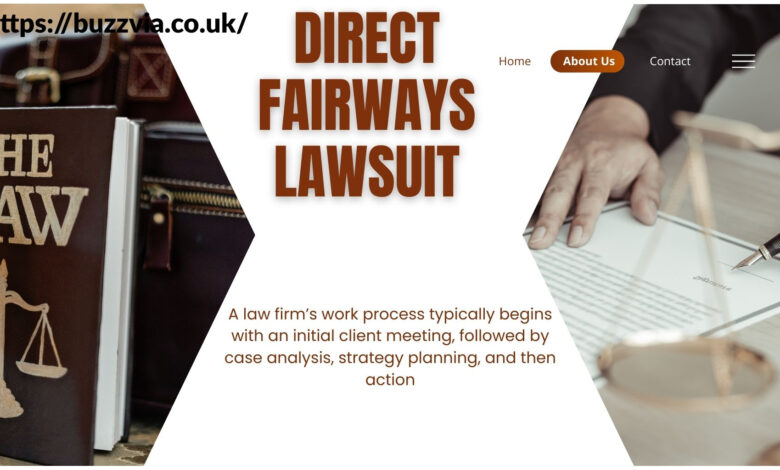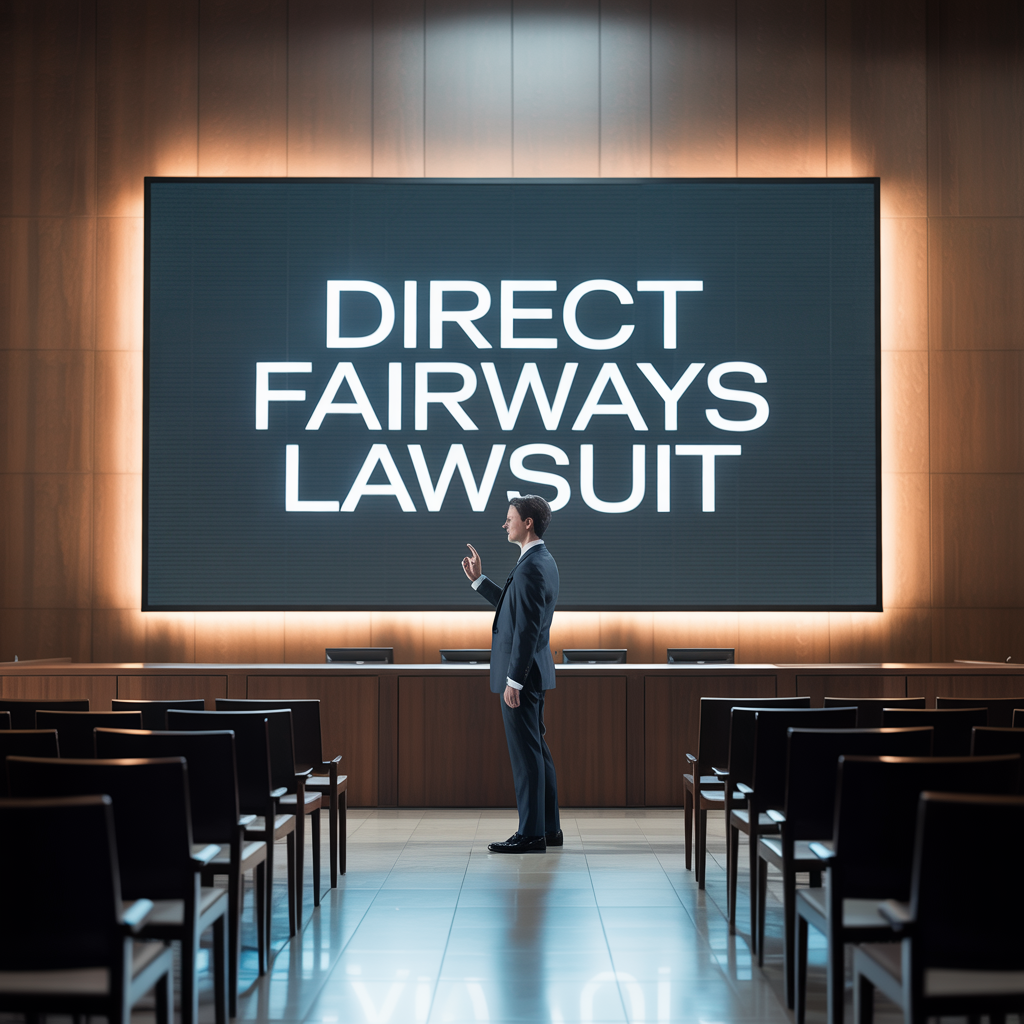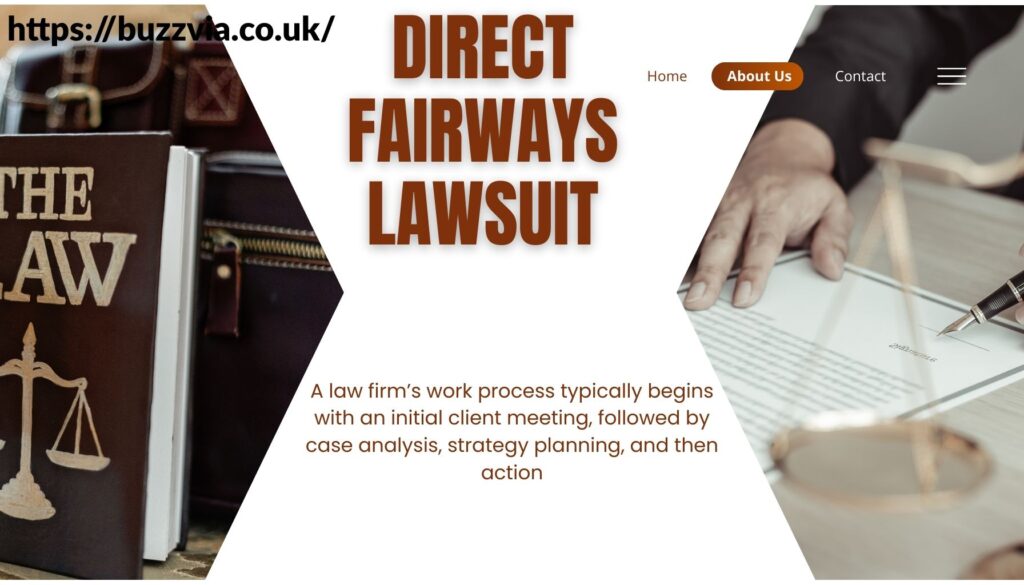Direct Fairways Lawsuit: Facts, Fallout, Fixes

Introduction
Golf marketing doesn’t usually make headlines, but the Direct Fairways Lawsuit has put a niche corner of advertising under a microscope. If you’re a course manager, a local business, or a golfer who’s seen ads on scorecards, this story intersects with your world. This explainer walks through what’s alleged, what’s known, and what to do if you’re affected without the fluff.
Before we hit the links, a brief aside: this post is educational and not a source of legal advice. Lawsuits change, and facts shift. Wherever possible, check facts against official filings and reliable sources. Still, we’ll separate fact from fiction and distill the essential allegations, the influence, and your options.
Who Is Direct Fairways?
Direct Fairways is a golf-space-focused marketing firm. The business model is simple: it sells advertising space to local companies and runs that ad on course guides, scorecards, and yardage books at golf clubs throughout the United States. In theory, it marries community businesses with a clearly defined audience olfers where they make purchasing decisions.
Along with print materials, some marketing packages may also feature digital components, branding, and coordination with distribution to clubs. For most small businesses, the guarantee is straightforward: be seen by a targeted, local, higher-income audience. That sounds like a real sales pitch. And for years, most advertisers and courses have utilized these solutions as a part of their local outreach.
The Direct Fairways Lawsuit Explained
The Direct Fairways Lawsuit didn’t happen overnight. It was preceded by a trend of complaint regarding the way services were marketed, delivered, and charged. Generally, plaintiffs allege aggressive sales practices, misrepresentation of exposure or distribution, and billing practices concerning charges they didn’t anticipate or couldn’t readily cancel.
To be sure, these are accusations. A lawsuit puts those assertions into a courtroom. It presumes to determine whether the sales methods were equitable, whether the deliverables met the sales pitch, and whether the firm observed its contractual and moral obligations. Although a court adjudicates facts, the dialogue within the golfing community is already resetting what buyers look for when assessing marketing suppliers.

What is Direct Fairways Lawsuit and how did this situation start?
In the majority of accounts, things were underway when frustrated advertisers felt that what they got wasn’t what they paid for. As more adverse experience mounted through reviews, discussion forums, and direct complaints the upset customers moved to formal complaints, which ultimately led to the Direct Fairways Lawsuit.
Momentum grows when a lot of people provide similar stories. Direct Fairways Lawsuit In this instance, ongoing stories involved pressure to sign, un-clear contract terms, trouble getting out, and uncertainty about actual distribution at partner courses. Those trends, fairly or unfairly, provide the setup for litigation and wider scrutiny.
Key Issues Raised in the Lawsuit
To begin with, plaintiffs complain of a transparency gap. According to them, they didn’t receive clear-as-day information regarding deliverables, timelines, and distribution proofs. In advertising, clarity is money. Expectation vs. reality causes trust to evaporate in an instant.
Direct Fairways Lawsuit Second, they reference contract confusion and customer service friction. Grievances depict terms that were difficult to comprehend and settlements that were tedious or disappointing. When a small business is unable to reconcile simply what it paid for with what it got, disputes tend to worsen.
Key Allegations and Complaints
Claims usually fall into four categories. The first is high-pressure sales techniques, which marketers define as high-pressure approach and come-sign-now deals. That approach may pay off in short cycles but often bites back in long-term B2B relationships.
The second and third buckets are misrepresented reach and billing disputes. Some complain that promised exposure didn’t live up to reality or that they had trouble cancelling. Others claim charges that didn’t reflect their interpretation of the bargain. Again, these are accusations, not proven facts but together they encapsulate the main dispute.
Impact on Customers and Businesses
Small companies operate lean. When a campaign underperforms or takes too long, the outcome is worse than frustration; it can be lost months of marketing runway. In addition to direct expense, there’s the opportunity cost of what those dollars could have done elsewhere.
There is also reputational and operational effect. Owners can become cynical about niche advertising, even if the vendor is well-regarded. That cynicism retards decision-making and sets a high standard for all providers perhaps a healthy outcome if it brings better documentation and proof points.
Direct Fairways Lawsuit’ Response
As with most firms involved in lawsuits, Direct Fairways has stood its ground. The wide position, as generally articulated, is that most customers are happy, that complaints are a minor portion of overall business, and that the firm makes an effort to address issues as they occur.
Its future success Direct Fairways Lawsuit will hinge on the transparency of its communications, integrity of its proof of performance, and equity of its resolution process. If it goes all in on openness imagine auditable distribution records, course verifications, and simply explained terms that may restore trust quicker than any announcement.

Official and Consumer-Based Action
Customers typically pursue two tracks: informal resolutions and formal actions. Informally, they request refunds, cancel future billings, and seek documented proof of distribution. Direct Fairways LawsuitFormally, they may file chargebacks, submit complaints to agencies, or, in some cases, join litigation.
Regulatory and consumer avenues may encompass your state Attorney General, the FTC for deceptive practices complaints, and agencies such as the BBB. These organizations don’t sue on every matter, but they do make a record. Trends in those records can affect outcomes, negotiations, or enforcement.
Practical steps if Direct Fairways Lawsuit charged your card or didn’t deliver
Begin with documentation. Gather signed agreements, emails, notes of calls, invoices, receipts of design approvals, confirmations of shipping or distribution, and screen shots of any promises. Next, compose a brief, professional description of the dispute including dates, dollar values, and sought resolution.
Then involve the vendor in writing. Request specific remedies refund, partial credit, or re-run by a specific deadline. If you are unable to come to resolution, call your bank and file a dispute/chargeback. Show that you made an effort to resolve the issue on your own; banks like you to have tried.
Direct Fairways Lawsuit Meanwhile, freeze additional exposure. Deactivate autopay, cancel card authorization, and ask for written confirmation of cancellation. File complaints with your state Attorney General and the FTC if you suspect a deceptive act took place. This is not about revenge; this is about accountability and making a record.
Lastly, speak with counsel if the sum in question is substantive or when you’re thinking about small claims court. A short consultation can make sense of your choices and assist you in selecting the most effective route. Once again, this isn’t legal advice simply a note that a 30-minute discussion with an expert might save you a week or more of speculation.
What This Means for the Golf Industry
Taking the bigger picture, the Direct Fairways Lawsuit is a wake-up call. Golf marketing occupies the corner of community commerce and specialist media. When something goes awry, it gets everyone in the category concerned about confidence, not merely a single provider. That’s not fair to the many credible vendors, but it’s reality.
The path forward is stronger verification. Courses and vendors can adopt simple practices like signed distribution logs, QR codes for digital tracking, and clear performance summaries. Advertisers, meanwhile, can require proof of performance as a standard clause.
Lessons for Businesses Considering Marketing Partnerships
First, slow down the sale. Request references from past campaigns and call them. Confirm course participation in person with the clubs. Ask for sample deliverables and a written distribution plan. And if anything in the pitch seems too hasty, hold back good partners will appreciate due diligence.
Second, nail down contract clarity. Set the number of units, distribution schedule, involved courses, make-good policy, cancellation provisions, and billing rhythm. Begin modestly. Pay by credit card for protection against disputes. And record each promise over the phone in an email confirmation then request the vendor to sign off on it.
The Road Ahead for Direct Fairways Lawsuit
What follows is contingent upon legal decisions and business revisions. Some cases are settled; some go to judgment; many call for policy revamps. One can rebound if it adopts transparency, customer-focused remediation, and measurable delivery.
For customers and classes, look for hints: more transparent agreements, traceable distribution channels, easier to cancel, and friendlier support. These are the tells of a seller determined to build long-term trust, not short-term victories.
CONCLUSION
Marketing alliances should be as effortless as a gentle swing, not a shank. Whatever the legal outcome, the Direct Fairways Lawsuit highlights an ageless point: clarity, documentation, and proof of performance serve all parties. When there are clear and documented expectations on both sides, grievances decrease and outcomes enhance.
If you’re affected, act promptly, keep records, and use the channels available to you. If you’re evaluating a new vendor, test small, verify claims, and keep your options open. Direct Fairways Lawsuit That’s not cynicism it’s smart stewardship of your brand and budget.

faqs
Q: Is the Direct Fairways Lawsuit resolved?
A: Lawsuits can take time and details change. Check official court records for current status before making decisions.
Q: Does a complaint imply the company committed something illegal?
A: Not always. A complaint is an accusation. Courts decide facts; settlements and verdicts define results.
Q: What’s the quickest way to resolve an unwanted charge?
A: Write to the vendor first, then phone your bank to open a dispute if necessary. Offer supporting documents for optimal results.
Q: How can I check ad delivery at a golf course?
A: Request distribution records and verify directly with the course. QR codes and time-stamped images can, too.
Q: Are print golf ads worthwhile?
A: They can be when distribution is authentic and audience fit is good. Use print as one of several channels in a diversified strategy with tracking.
Q: May I cancel in the middle of a contract?
A: It varies with your contract. Read cancellation provisions and state consumer protection laws; hire legal advice for details.
Q: What do I require in a marketing agreement?
A: Clarity of deliverables, schedule, participating locations, proof-of-performance expectations, cancellation policy, and billing cycle.